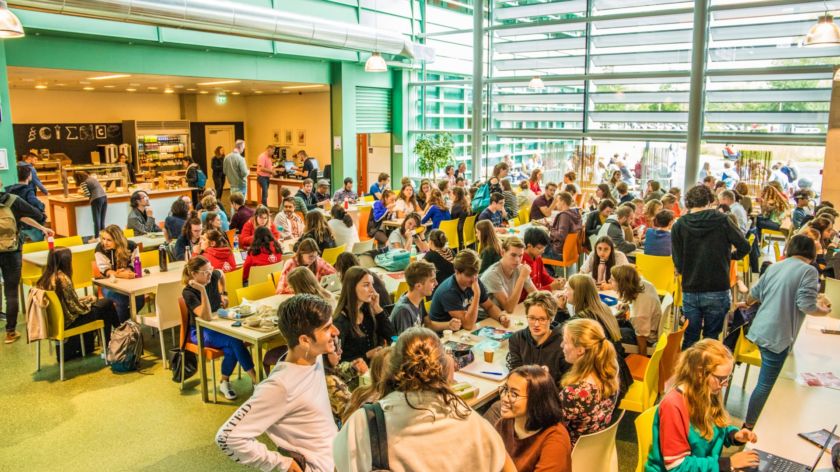Working from home once the coronavirus crisis is over? ‘It’s too early to draw conclusions’
-
 Drukte op de campus vóór de coronacrisis. Foto: Tom Hessels
Drukte op de campus vóór de coronacrisis. Foto: Tom Hessels
Members of the Works Council feel that the Executive Board is too quick to assume that people will want to continue to work remotely a few days a week once the coronavirus crisis is over. According to Inge Bleijenbergh and Sven Meeder, it is much too early to draw conclusions. ‘Let’s not throw our entire vision of work overboard.’
As far as the Executive Board is concerned, Radboud University staff will continue to work remotely a few days a week once the coronavirus crisis is over. This sentiment has been repeatedly expressed by Vice President Wilma de Koning, in Vox interviews and elsewhere. And the newest staff survey also includes questions about working from home post-coronavirus.
Scarse office space
Members of the Works Council find this conclusion much too premature. Inge Bleijenbergh (AOB) sees working from home in these times as a luxury, but also as an emergency measure that carries great disadvantages. ‘Organising things from home is not efficient and email communication creates many misunderstandings,’ she says during a Zoom interview. ‘Right now, we all try to make the best of it. Let’s wait until the coronavirus crisis blows over and then evaluate whether we want to continue to work from home.’
Sven Meeder (FNV) agrees with her. ‘When I first started working at Radboud University, I noticed that nearly everyone worked on Campus. In Utrecht, where I’d worked as a postdoc, things were very different. We had to share the scarce office space with many other people, so those who had a nice workspace at home never came to Campus.’
Meeder and Bleijenbergh are of the opinion that it’s unwise to decide in the midst of a crisis what you want to retain after the crisis. ‘We understand that working from home is cheaper,’ says Meeder. ‘And we cannot shake off the feeling that this is an important factor for the Board.’
Do you speak for all University staff members? The staff survey shows that 65% of staff members would like to continue to work from home at least one or two days a week once the coronavirus crisis is over.
Bleijenbergh: ‘This partially has to do with how the question was formulated: the most limited option available was working from home ‘0% to 25% of the time after the coronavirus crisis. I personally don’t want to work from home at all, but I automatically ended up in the ‘up to 25%’ group. Based on the Works Council’s input, the new survey includes two additional options: 0% work from home and 100% work from home.’
‘I also found the communication concerning the results of the staff survey to be selective. There was much attention for the increase in work pressure, but not for the fact that people felt less connected to the University, were experiencing mental health problems, or had too little contact with their colleagues. All of which, unsurprisingly, are consequences of working from home.’
Meeder: ‘Actually, the staff survey clearly shows how important it is to have a workplace on Campus. When formulating policy, it would be a good idea to prioritise mental health and well-being among the staff, rather than housing.’
Isn’t it a good thing that the Executive Board wishes to map the wishes of the staff?
Bleijenbergh: ‘Of course it is, but let’s wait until the crisis is over before drawing conclusions about working remotely. And let’s also look at how important workspace at the University is for PhD students and postdocs who live in cramped apartments and need a good place to work. Not to mention parents of young children who would like to come to Campus from time to time to work in peace.’
During the Joint Assembly Wilma de Koning argued that there was a lot of unused office space on Campus before the coronavirus crisis.
Meeder: ‘The Board wants to have buildings that are flexible in use, which our Campus buildings are. For example, there used to be libraries spread out throughout the Erasmus building, but that’s no longer the case today. Still, you have to adjust the buildings to the users’ needs, not the other way around. So let’s enjoy what we have: spaces where staff members can meet, but also be productive. The coronavirus crisis shouldn’t lead to throwing our entire vision of work overboard.’
Bleijenbergh: ‘If you have to share an office with four PhD students, it’s easier to stay at home if you want to focus. On my floor people who have an office of their own tend to spend more time there than people who share an office. It’s also much easier for students to knock on the door and ask a question if lecturers have their own office. It works so much better than sending five emails back and forth. And when you meet colleagues in the hallway, you can exchange news and ask how they are. These kinds of interactions are not so likely to happen via email.’
‘Less office space leads to more unused space’
Meeder: ‘How a workplace is designed determines whether it will be used. Before the coronavirus crisis I used to cycle over the Drift in Utrecht, past my former workplace. The rooms there are nearly always empty, because people often have to share an office with three other people. The little office space there is goes unused. Less office space leads to more unused space: it seems paradoxical, but it’s also logical.’
Doesn’t promoting working from home lead to less road traffic and fewer cars on Campus, themes that you also find important as participational body?
Meeder: ‘I think there are many more students coming to Campus every day than staff members who might opt to work from home. But I’m definitely in favour of further reducing the number of cars allowed on Campus.’
Bleijenbergh: ‘In theory, yes, but in practice, everyone wants to work from home on the one day when there are no meetings, like Wednesday or Friday. Which is why you cannot assume when assigning office space that one person will be there one day and the other person the next day, because we will still want to see each other on peak days. What you can do is reduce traffic pressure by introducing flexible working times, an option that is luckily already available to most researchers.’
In the last months before the coronavirus crisis, the Refter was really crowded in the afternoons, and there were capacity problems at the Faculty of Science. Is the Campus too small for the number of staff members and students, and might working from home be a solution for this problem?
Bleijenbergh: ‘If the Campus is too small, it’s because of the strong increase in student numbers in the last six to seven years. Staff numbers have not grown apace – which is why work pressure is so high. So I doubt that working from home will lead to a less crowded Campus.’
‘Working more from home will not lead to a less crowded Campus’
Meeder: ‘If you want to be flexible, make sure you create sufficient and beautiful office space for the staff. If the next fifteen years reveal that people want to work from home more, you’ll have more workspace for students.’
What would be a good way to map the wishes of the staff after the coronavirus crisis?
Bleijenbergh: ‘A survey is a good method for measuring data, but the next step is to enter into dialogue, with the support and management staff and the academic staff, at all the faculties.’





